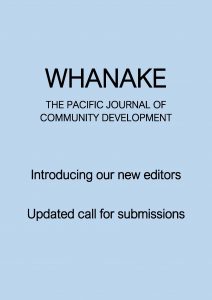Whanake: The Pacific Journal of Community Development has two new co-editors. Both are keen to continue the great work of the journal and ensure the journal continues as a voice and space for ideas and perspectives for those interested in community development. We look forward to an exciting year and welcome all forms of submissions about our shared area of passion – Community Development.
Introducing the New Co-editors:
Hoa Thi Nguyen (she / her). Hoa teaches at the School of Healthcare and Social Practice, Unitec New Zealand, and is a registered social worker. She received a Master of Social Work and a PhD in Social Work from the University of Minnesota, USA. Hoa has been doing research and publishing in the area of young care leavers, social-work education, financial capability and financial self-efficacy, microfinance, children exposed to domestic violence, and immigrants/refugees. She currently teaches courses in advanced social-work theories, research methods, community development, and Treaty-based practice. Hoa has extensive experience in community development, especially in an international context through her work in Vietnam.
David Kenkel (he / him). David teaches at the School of Healthcare and Social Practice, Unitec New Zealand. He is a registered social worker and currently finishing PhD study through the Taos Institute. David teaches courses in advocacy, family violence studies, child protection and community development. Alongside teaching, David is also involved in a range of community activities, including being the Co-chair of Community Waitākere. David’s Whakapapa includes Dutch, Flemish, English and Scots. David was born, raised and still lives in West Auckland, and is very committed to the local community. David’s PhD topic explores how people and communities might be different in a future likely to be considerably more resource poor than the current day. How communities will adapt in the face of environmental and societal change continues as a key research interest.
CALL FOR SUBMISSIONS
About the Journal
Whanake: The Pacific Journal of Community Development is an open access e-journal for practitioners, academics and anyone interested in community development. The journal’s mission is to serve as a crucible of democracy, championing change from below. The Journal operates as a virtual space where people can come together to establish solidarity, share dreams, and plans, tell stories and explore new ideas. The journal includes refereed papers of 3000–6000 words, unrefereed practice notes from the field, reviews and opinion pieces. The journal creates space for posing questions, documenting emerging trends in research and practice, sharing case studies and biographies, and exploring new possibilities.
Community development journals exist in the UK, USA and Australia. As co-editors we see Whanake as a journal for Aotearoa New Zealand and the wider Pacific. As such it must reflect a commitment to Te Tiriti o Waitangi and a respect for the broad cultural diversity of Aotearoa and the wider Pacific. Whanake is about the WE, not the I.
Whanake accepts submissions in the form of papers for peer review, practice notes from the field, case studies and articles on emerging trends and research, as well as opinion pieces, biographies, reviews of books, plays, films, poems, songs and contemporary culture with a community development theme. We particularly welcome work by students and those new to the field of community development.
As an international journal, Whanake typically uses English as a language understood by many across the world. Submissions will be published in English or te reo Māori.
In a departure from previous practice, single papers and other submissions of work will be e-published as soon as they are reviewed and edited – with a full journal of all work published at the end of the calendar year. Submissions for this year will be accepted until 1 June 2023.
Please note that submission is possible only by email, to the editors. (Contact details below.)
All submissions must be in Microsoft Word format.
FONT: Arial, 12 point.
TABLES: Please send tables or figures in Word format.
IMAGES should be sent separately in .jpg format with their file names as the relevant figure #, along with a separate Microsoft Word document that lists the figures and codes them back to the .jpg file. In the submitted document write ‘Insert Figure #’
PLEASE NOTE: Authors will need to obtain permission to reproduce any copyrighted material.
SUBMISSION LENGTH
Refereed papers:
3000 to 6000 words. Refereed papers take longer to be readied for publication than non-refereed work.
Non-refereed work:
Opinion pieces: Provocations that challenge practice and/or theory, up to 1200 words
Practice reflections: 2000 to 4000 words
Practice notes: 500 to 600 words
Case studies and biographies: 1000 to 1500 words
Articles on emerging trends and research: Up to 1200 words
Reviews: Up to 600 words
All submissions need to follow the APA style guide, 7th edition, for citations and referencing. A guide is available here: http://libguides.unitec.ac.nz/apareferencing
Submissions to the editors:
Hoa Nguyen hnguyen@unitec.ac.nz
David Kenkel dkenkel@unitec.ac.nz
Ngā manaakitanga,
Hoa and David
